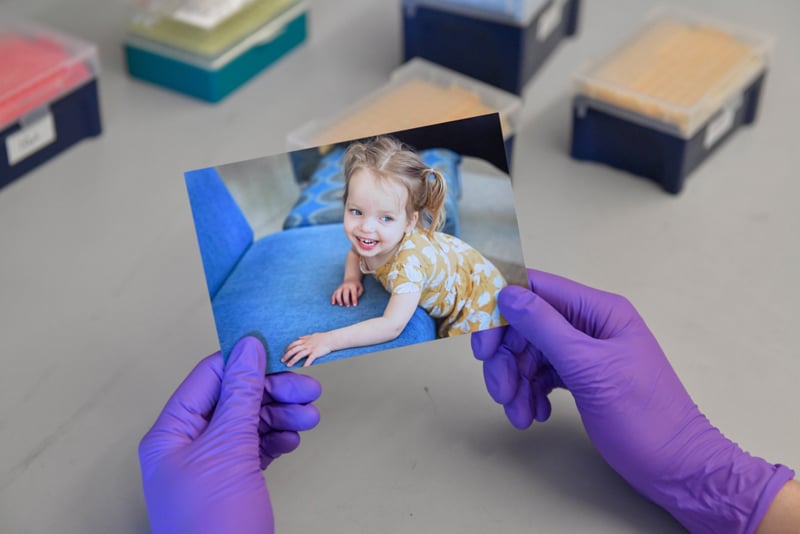Inside a gene therapy lab at UMass Chan Medical School, you’ll find the typical test tubes, pipettes, microscopes and incubators. The tools of scientists looking to discover a treatment for a hereditary disease that has none. But you’ll also find something unexpected. Photographs of real patients, like 3-year-old Noa.
Noa Greenwood was one of the first children with Canavan disease—a progressive, fatal genetic disorder affecting the central nervous system—to receive an investigational gene therapy developed here. Since her treatment nearly a year earlier, her development has blossomed.
“She’s learning and growing every day in different ways. What Noa is doing now is just what my grandchildren would do,” said Guangping Gao, PhD. “Canavan research is part of my life, and to see gene therapy make a difference, it’s just so satisfying.”
Dr. Gao, the Penelope Booth Rockwell Professor in Biomedical Research and professor of microbiology & physiological systems, is director of the Horae Gene Therapy Center and director of the Li Weibo Institute for Rare Diseases Research.
Canavan disease is one of the many diseases being investigated by Gao and his team. Advances in gene therapy at UMass Chan Medical School over the past two decades have garnered worldwide attention, including a Nobel Prize.
Gene therapy corrects genetic information that causes illness. Some applications are for inherited genetic diseases such as Tay-Sachs and types of amyotrophic lateral sclerosis; others go after infectious diseases such as COVID-19; while others address solid tumors and lymphomas. For patients with rare diseases without a known treatment, gene therapy can change lives.
“Through my years of research, the patients and families are really my drivers,” said Gao. “They push me, and I really always feel I’m very closely connected with the community of Canavan disease, with parents and kids.”
Building a rich environment for collaboration in this line of research is no accident. UMass Chan has recruited world-class faculty and established pioneering centers that, working together through partnerships with other leading researchers and the biopharma industry, are bringing us closer to conquering debilitating diseases.
“UMass Chan is definitely among the top gene therapy research centers in the U.S., and the U.S. leads the world in gene therapy development,” said Gao. He has dedicated much of his career to developing a gene therapy for Canavan disease. Early results from a clinical trial of an investigational therapy developed by UMass Chan researchers led by Gao and Dominic J. Gessler, MD, PhD’20, assistant professor of neurological surgery, show promising results.
In April of 2023, Noa delivered a very special “thank you” to the UMass Chan research team in a visit with her parents.
The cheerful toddler played shyly with the scientists, babbled to her parents, sat up in a booster seat at a big conference table and fed herself snacks. It was a far cry from her development 10 months earlier, before she received the first dose of gene therapy BBP-812.
“When I say medical miracle, it’s not just me being a proud parent,” said Noa’s mother, Lori Greenwood. “It’s really hard for me to express it because it is so monumental.”
Noa’s progress inspires UMass Chan’s scientific community. “In clinical practice, you identify problems or diseases. But bringing those questions back to the lab and trying to find answers, and then seeing a child who responds, feels like you can grab the answer. It’s bench to bedside, to bench,” said Dr. Gessler.
